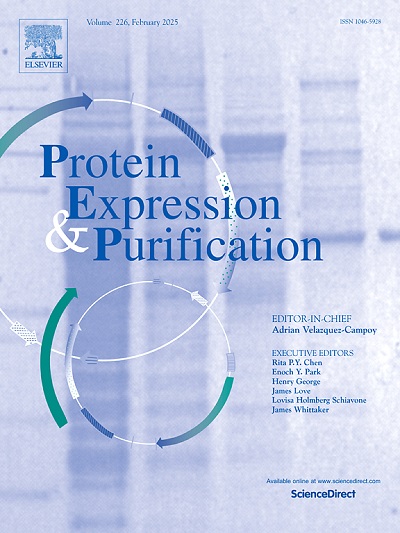通过融合tokodaisulfolobus Sto7d提高柯达热球菌KOD1聚合酶的PCR性能
IF 1.2
4区 生物学
Q4 BIOCHEMICAL RESEARCH METHODS
引用次数: 0
摘要
kodakarensis热球菌(Thermococcus KOD1, KOD)的DNA聚合酶因其高精密度和保真度被广泛应用于聚合酶链反应(polymerase chain reaction, PCR)中。然而,像许多其他b家族DNA聚合酶一样,它在延伸效率、扩增子长度和对PCR抑制剂的抗性方面存在局限性。为了进一步增强其能力,我们将tokodaii Sulfolobus (Sto7d)中一个7 kDa的非特异性双链DNA (dsDNA)结合蛋白通过不同的肽连接体融合到KOD的c端,从而构建了一组KOD-Sto7d聚合酶变体。这些结构被表达、纯化和表征。其中,KOD-GT4G-Sto7d表现出最好的PCR性能,并被选为后续检测的代表性变异。与野生型KOD (KOD- wt)相比,KOD- sto7d扩增效率显著提高,在10 s的延伸时间内扩增出7 kb的目标,对2 kb目标的耐盐性提高到120 mM NaCl,在4 min内扩增10 kb长的DNA片段的能力也有所提高。与市售的在其c端融合dsdna结合蛋白(来自Saccharolobus solfataricus的Sso7d)的KOD突变体(KOD-Sso7d)相比,KOD- sto7d表现出更强的耐盐性和敏感性。这些结果表明KOD-Sto7d是一种强大的聚合酶,适合于节省时间和高要求的PCR。本文章由计算机程序翻译,如有差异,请以英文原文为准。
Enhanced performance of Thermococcus kodakarensis KOD1 polymerase in PCR via fusion to Sulfolobus tokodaii Sto7d
The DNA polymerase from Thermococcus kodakarensis KOD1 (KOD) is widely utilized in polymerase chain reaction (PCR) due to its high processivity and fidelity. However, like many other B-family DNA polymerases, it faces limitations in extension efficiency, amplicon length, and resistance to PCR inhibitors. In order to further enhance its capability, novel mutants were engineered by fusing a 7 kDa nonspecific double-stranded DNA (dsDNA)-binding protein from Sulfolobus tokodaii (Sto7d) to the C-terminus of KOD via distinct peptide linkers, resulting in a set of KOD-Sto7d polymerase variants. These constructs were expressed, purified, and characterized. Among the variants, KOD-GT4G-Sto7d exhibited the best PCR performance and was selected as the representative variant for subsequent assays. Compared with wild-type KOD (KOD-WT), KOD-Sto7d demonstrated significantly improved extension efficiency that successfully amplified 7 kb targets with only 10 s elongation time, increased salt tolerance up to 120 mM NaCl for 2 kb targets, and an improved capacity to amplify long DNA fragments up to 10 kb within 4 min. In comparison with a commercially available KOD mutant fused to a dsDNA-binding protein (Sso7d from Saccharolobus solfataricus) at its C-terminus (KOD-Sso7d), KOD-Sto7d demonstrated greater salt tolerance and sensitivity. These results suggest that KOD-Sto7d is a robust polymerase suitable for time-saving and high-demanding PCR.
求助全文
通过发布文献求助,成功后即可免费获取论文全文。
去求助
来源期刊

Protein expression and purification
生物-生化研究方法
CiteScore
3.70
自引率
6.20%
发文量
120
审稿时长
32 days
期刊介绍:
Protein Expression and Purification is an international journal providing a forum for the dissemination of new information on protein expression, extraction, purification, characterization, and/or applications using conventional biochemical and/or modern molecular biological approaches and methods, which are of broad interest to the field. The journal does not typically publish repetitive examples of protein expression and purification involving standard, well-established, methods. However, exceptions might include studies on important and/or difficult to express and/or purify proteins and/or studies that include extensive protein characterization, which provide new, previously unpublished information.
 求助内容:
求助内容: 应助结果提醒方式:
应助结果提醒方式:


